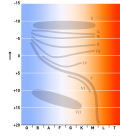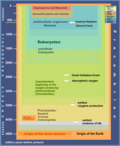A giant planet, sometimes referred to as a jovian planet (Jove being another name for the Roman god Jupiter), is a diverse type of planet much larger...
21 KB (2,657 words) - 22:43, 15 October 2024
gas giant is a giant planet composed mainly of hydrogen and helium. Jupiter and Saturn are the gas giants of the Solar System. The term "gas giant" was...
18 KB (1,909 words) - 02:06, 14 October 2024
has eight planets by the most restrictive definition of the term: the terrestrial planets Mercury, Venus, Earth, and Mars, and the giant planets Jupiter...
197 KB (20,760 words) - 20:14, 24 October 2024
An ice giant is a giant planet composed mainly of elements heavier than hydrogen and helium, such as oxygen, carbon, nitrogen, and sulfur. There are two...
21 KB (2,338 words) - 01:49, 19 October 2024
five-planet Nice model is a numerical model of the early Solar System that is a revised variation of the Nice model. It begins with five giant planets, the...
69 KB (8,544 words) - 21:57, 21 September 2024
to 460 +160 −100 AU. Batygin & Brown suggested that Planet Nine may be the core of a giant planet that was ejected from its original orbit by Jupiter...
176 KB (18,915 words) - 22:23, 5 November 2024
Solar System (redirect from Inner planet)
and Saturn); and two ice giants (Uranus and Neptune). All terrestrial planets have solid surfaces. Inversely, all giant planets do not have a definite surface...
222 KB (21,901 words) - 03:04, 10 November 2024
Lowell's quest for Planet X. Lowell proposed the Planet X hypothesis to explain apparent discrepancies in the orbits of the giant planets, particularly Uranus...
76 KB (9,330 words) - 21:06, 5 November 2024
Jumping-Jupiter scenario (section Fifth giant planet)
evolution of giant-planet migration described by the Nice model, in which an ice giant (Uranus, Neptune, or an additional Neptune-mass planet) is scattered...
103 KB (13,549 words) - 21:21, 16 July 2024
Jupiter (redirect from Planet Jupiter)
fifth planet from the Sun and the largest in the Solar System. It is a gas giant with a mass more than 2.5 times that of all the other planets in the...
173 KB (16,314 words) - 06:32, 8 November 2024
Exoplanet orbital and physical parameters (redirect from Solid giant planet)
giant planet formation to be within 10 AU, where the planets can coalesce quickly enough before the disk evaporates. Very-long-period giant planets may...
56 KB (6,536 words) - 15:27, 4 October 2024
Neptune (redirect from Planet Neptune)
known planet from the Sun. It is the fourth-largest planet in the Solar System by diameter, the third-most-massive planet, and the densest giant planet. It...
145 KB (14,176 words) - 09:48, 4 November 2024
S2CID 247065421. "The Outer Planets: Giant Planets: What Are They, and Where Are They?". lasp.colorado.edu. Retrieved 2024-04-21. "Two planets found sharing one...
13 KB (547 words) - 05:07, 25 August 2024
Ring system (redirect from Planet ring)
known as planetary rings, common components of satellite systems around giant planets such as of Saturn, or circumplanetary disks. But they can also be galactic...
39 KB (3,937 words) - 13:05, 25 September 2024
Exoplanet (redirect from Exosolar planet)
suggestion is that planets should be distinguished from brown dwarfs on the basis of their formation. It is widely thought that giant planets form through core...
147 KB (15,944 words) - 22:13, 9 November 2024
Reflection Spectra of Extrasolar Giant Planets and expanded on in Theoretical Spectra and Atmospheres of Extrasolar Giant Planets, published before any successful...
13 KB (1,385 words) - 18:03, 1 October 2024
Subgiants Giants Red giants Blue giants Bright giants Supergiants Red supergiant Hypergiants absolute magni- tude (MV) A red giant is a luminous giant star...
28 KB (3,491 words) - 20:40, 21 October 2024
Planetary system (redirect from Double-planet system)
planets orbiting the pulsar PSR B1257+12. The first confirmed detection of exoplanets of a main-sequence star was made in 1995, when a giant planet,...
48 KB (5,536 words) - 16:08, 9 October 2024
A helium planet is a planet with a helium-dominated atmosphere. This contrasts with ordinary gas giants such as Jupiter and Saturn, whose atmospheres consist...
5 KB (577 words) - 09:06, 18 May 2024
List of largest exoplanets (redirect from Biggest planet)
Johansen, A.; Janson, M.; Rafikov, R. (2014). "Giant Planet and Brown Dwarf Formation". Protostars and Planets VI. arXiv:1401.7559. doi:10...
204 KB (11,985 words) - 10:48, 10 November 2024
Nebular hypothesis (redirect from Planet formation)
producing a few terrestrial planets. The last stage takes approximately 100 million to a billion years. The formation of giant planets is a more complicated...
75 KB (9,172 words) - 06:52, 3 November 2024
Uranus (redirect from Planet Uranus)
Uranus is the seventh planet from the Sun. It is a gaseous cyan-coloured ice giant. Most of the planet is made of water, ammonia, and methane in a supercritical...
158 KB (15,616 words) - 06:37, 8 November 2024
containing Giant Giant planet, a type of planet Gas giant, a giant planet composed primarily of hydrogen and helium Ice giant, a giant planet composed primarily...
11 KB (1,290 words) - 23:32, 25 October 2024
Late Heavy Bombardment (section Giant-planet migration)
Nice model, popular among planetary scientists, postulates that the giant planets underwent orbital migration, scattering objects from the asteroid belt...
43 KB (5,433 words) - 08:06, 1 October 2024
Planet of Giants is the first serial of the second season in the British science fiction television series Doctor Who. Written by Louis Marks and directed...
21 KB (2,174 words) - 05:50, 4 October 2024
Nice model (section Five-planet Nice model)
developed in 2005—in Nice, France. It proposes the migration of the giant planets from an initial compact configuration into their present positions,...
47 KB (5,830 words) - 14:39, 6 November 2024
Formation and evolution of the Solar System (redirect from Origin of planets)
was for the inner planets to migrate inward as the disk dissipated, leaving the planets in their current orbits. The giant planets (Jupiter, Saturn, Uranus...
113 KB (13,496 words) - 07:25, 2 November 2024
Nibiru cataclysm (redirect from Planet X collision)
been shown to be based on a faulty understanding of Sumerian text, a giant planet (called Nibiru or Marduk) passes by Earth every 3,600 years, allowing...
89 KB (8,650 words) - 10:16, 7 November 2024
Accretion (astrophysics) (redirect from Accretion of planets)
planets differs from that of giant gas planets, also called Jovian planets. The particles that make up the terrestrial planets are made from metal and rock...
40 KB (4,411 words) - 22:19, 21 September 2024
Exomoon (section Doppler spectroscopy of host planet)
moons. For extrasolar giant planets orbiting within their stellar habitable zone, there is the prospect that terrestrial planet-sized satellite may be...
34 KB (4,121 words) - 09:17, 2 November 2024






















